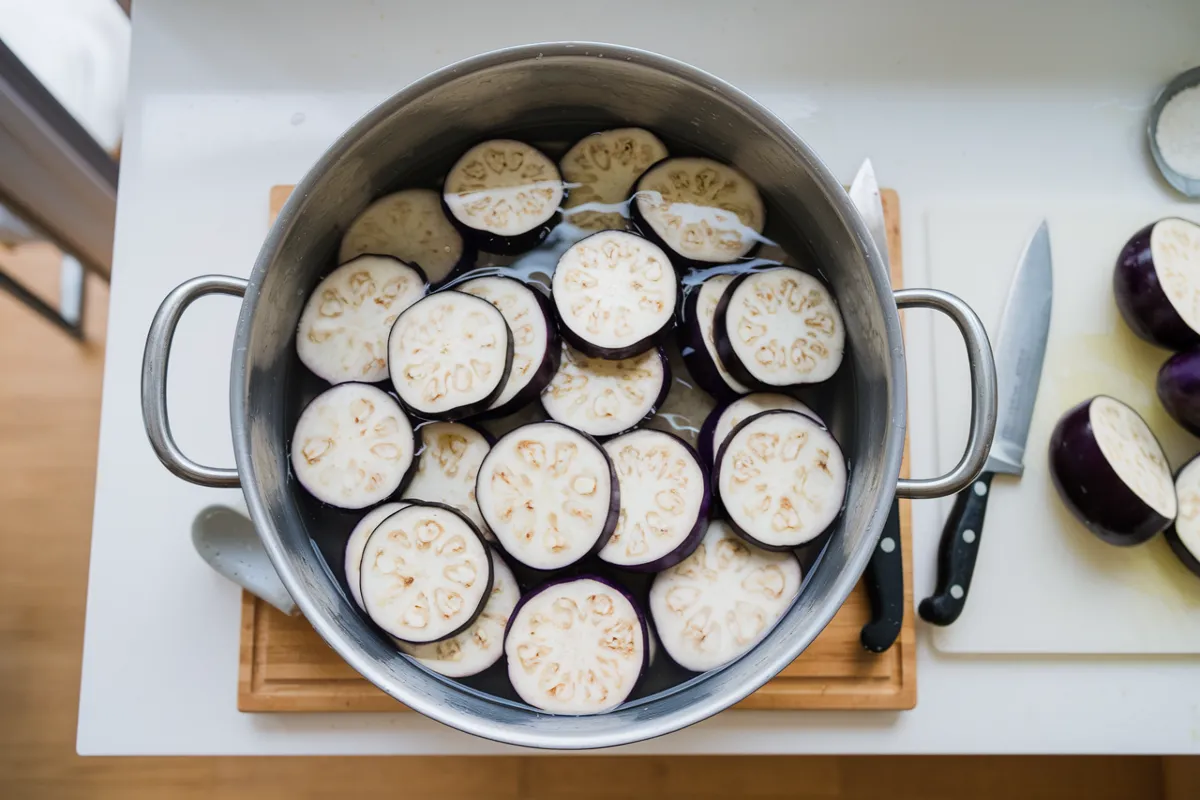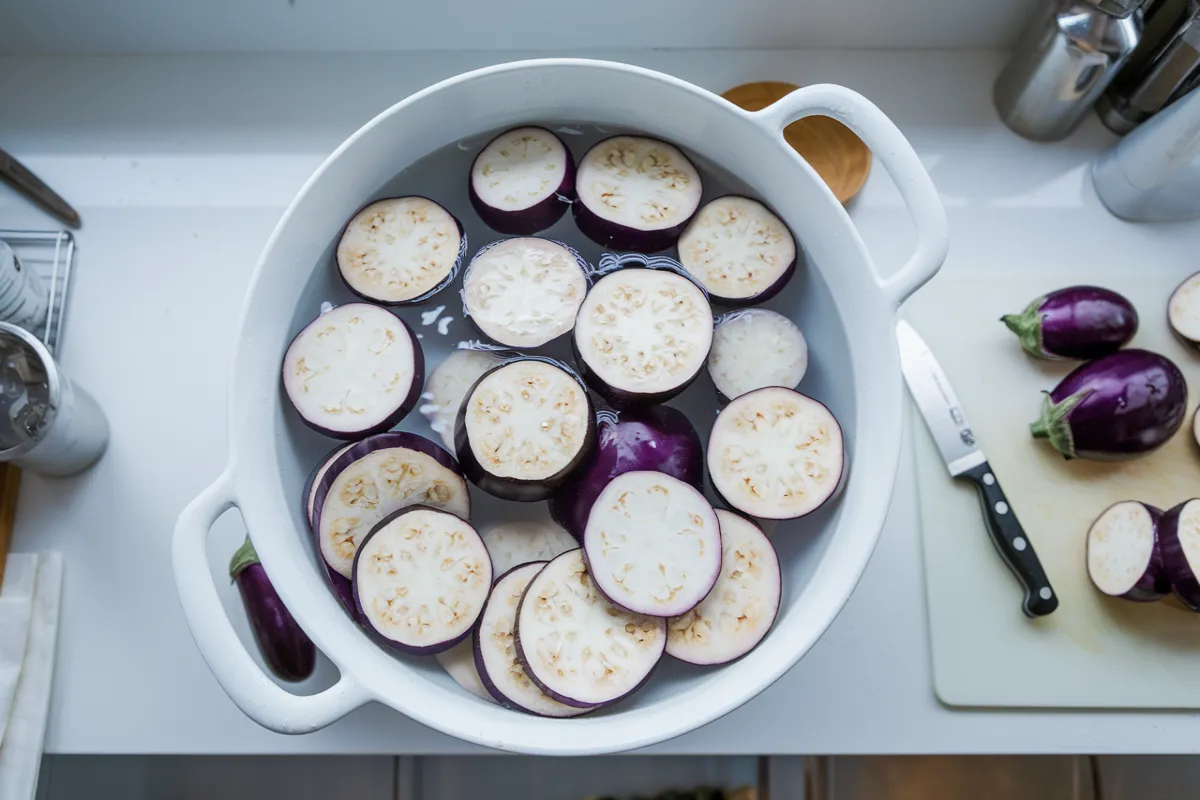Table of Contents
- Introduction
- Understanding Eggplant
- What is Eggplant?
- Nutritional Benefits of Eggplant
- Common Culinary Uses of Eggplant
- The Role of Water in Cooking
- Importance of Water in Food Preparation
- How Water Interacts with Different Vegetables
- Why Eggplant Specifically Benefits from Soaking
- Why Soak Eggplant in Water Before Cooking?
- Reducing Bitterness
- Improving Texture
- Preventing Excess Oil Absorption
- Retaining Color and Preventing Browning
- How to Properly Soak Eggplant
- Step-by-Step Guide to Soaking Eggplant
- Tips for Effective Soaking
- Variations in Soaking Methods
- Common Mistakes When Soaking Eggplant
- Over-Soaking and Its Effects
- Using the Wrong Type of Water
- Not Draining Properly Before Cooking
- Alternative Methods to Prepare Eggplant
- Salt-Only Method
- Drying Out the Eggplant
- Blanching as an Alternative to Soaking
- Frequently Asked Questions About Soaking Eggplant
- Does Soaking Eggplant Really Remove Bitterness?
- How Long Should You Soak Eggplant?
- Can You Soak Eggplant Overnight?
- Is It Necessary to Salt the Water?
- What Happens If You Skip Soaking?
- Conclusion
- FAQs
Introduction
If you’ve ever wondered why soaking eggplant in water before cooking is recommended, you’re not alone. Why soak eggplant in water before cooking? This practice is rooted in both tradition and science, offering benefits that can elevate your eggplant dishes. By soaking eggplant, you can improve its flavor, texture, and overall quality, ensuring that your meals turn out delicious every time.
Understanding Eggplant
What is Eggplant?
Eggplant, or aubergine as it’s known in some parts of the world, is a member of the nightshade family, closely related to tomatoes, peppers, and potatoes. It’s distinguished by its spongy texture and slightly bitter taste, making it a versatile ingredient in a wide variety of dishes.
Nutritional Benefits of Eggplant
Eggplant is not only versatile in the kitchen but also packed with nutrients. It’s low in calories and rich in fiber, vitamins, and minerals, making it a healthy addition to your diet. Why soak eggplant in water before cooking when it’s already so beneficial? Because soaking can enhance its culinary qualities, ensuring you get the most out of this nutritious vegetable.
Common Culinary Uses of Eggplant
Eggplant is a favorite in many global cuisines, from Mediterranean to Asian dishes. It can be grilled, roasted, fried, or baked, and is commonly used in recipes like moussaka, eggplant Parmesan, and baba ganoush. However, its spongy texture means it can absorb a lot of oil, which is one of the reasons why soaking it in water beforehand is so helpful.
The Role of Water in Cooking
Importance of Water in Food Preparation
Water is essential in various cooking methods, from boiling and steaming to soaking. In the context of eggplant, soaking in water is particularly beneficial. Why soak eggplant in water before cooking? The water helps to improve the vegetable’s texture and flavor, making it more enjoyable to eat.
How Water Interacts with Different Vegetables
Different vegetables react differently to soaking. For instance, soaking potatoes can help remove excess starch, while soaking beans can reduce cooking time. Eggplant, due to its unique structure, benefits significantly from soaking as it absorbs moisture that mitigates bitterness and prevents excessive oil absorption during cooking.
Why Eggplant Specifically Benefits from Soaking
Eggplant’s spongy texture allows it to absorb flavors and liquids easily. Soaking it in water helps to fill its porous structure with moisture, which in turn reduces its natural bitterness and prevents it from soaking up too much oil during cooking.
Why Soak Eggplant in Water Before Cooking?
Reducing Bitterness
One of the primary reasons why soaking eggplant in water before cooking is recommended is to reduce bitterness. Although modern eggplant varieties are less bitter than those in the past, some bitterness can still be present, especially in larger or older eggplants. Soaking helps to leach out these bitter compounds, resulting in a milder taste.
Improving Texture
Eggplant’s texture can be tricky to get right. Without proper preparation, it can become mushy or overly soft. Soaking helps to firm up the eggplant’s flesh, ensuring it retains a pleasant texture when cooked, whether you’re grilling, frying, or roasting.
Preventing Excess Oil Absorption
A key reason why soaking eggplant in water before cooking is so effective is that it limits the amount of oil the eggplant absorbs. Due to its spongy nature, eggplant can soak up large amounts of oil, making your dish greasy. By soaking the eggplant, you fill its pores with water, reducing the amount of oil it can absorb during cooking.
Retaining Color and Preventing Browning
Cut eggplant can quickly turn brown due to oxidation. Soaking the slices in water helps prevent this discoloration, keeping the eggplant looking fresh and appetizing. The water acts as a barrier, slowing down the oxidation process and helping to preserve the eggplant’s natural color.

How to Properly Soak Eggplant
Step-by-Step Guide to Soaking Eggplant
- Slice the Eggplant: Start by cutting the eggplant into your desired shape—whether rounds, cubes, or strips.
- Prepare the Water: Fill a large bowl with cold water. For added effectiveness, you can also add a pinch of salt to the water.
- Submerge the Eggplant: Place the eggplant slices in the water, ensuring they are fully submerged. To keep them underwater, place a plate or another weight on top.
- Soak for 15-30 Minutes: Allow the eggplant to soak for at least 15 minutes but no longer than 30 minutes. This time frame is sufficient to reduce bitterness and improve texture without making the eggplant too soft.
- Drain and Pat Dry: After soaking, drain the eggplant in a colander and pat the slices dry with a clean kitchen towel. Proper drying is crucial to avoid excess moisture during cooking.
Tips for Effective Soaking
- Use Cold Water: Cold water helps maintain the eggplant’s firmness.
- Don’t Over-Soak: Over-soaking can lead to a mushy texture, so stick to the recommended time.
- Pat Dry Thoroughly: Drying the eggplant properly ensures it won’t steam when cooked, which could ruin its texture.
Variations in Soaking Methods
- Salted Water: Adding salt to the soaking water can enhance the bitterness reduction and help the eggplant retain its shape during cooking.
- Acidic Water: Some chefs recommend adding a splash of vinegar or lemon juice to the water. This can help preserve the eggplant’s color and further reduce bitterness.
Common Mistakes When Soaking Eggplant
Over-Soaking and Its Effects
While soaking is beneficial, leaving eggplant in water for too long can result in a mushy texture. Over-soaked eggplant will absorb too much water, making it difficult to achieve a crispy texture when frying or grilling.
Using the Wrong Type of Water
Using warm or hot water can cause the eggplant to become too soft. Always use cold or room-temperature water to maintain the right texture.
Not Draining Properly Before Cooking
Failing to drain and pat dry the eggplant after soaking can lead to excess moisture in your dish, resulting in soggy, unappetizing eggplant. Make sure to dry the slices thoroughly before cooking.
Alternative Methods to Prepare Eggplant
Salt-Only Method
Instead of soaking in water, some chefs prefer to sprinkle salt directly onto sliced eggplant and let it sit for 15-30 minutes. The salt draws out moisture and bitterness, similar to soaking. Afterward, rinse the eggplant to remove excess salt and pat dry.
Drying Out the Eggplant
Another technique involves drying out the eggplant slices by letting them sit out in a well-ventilated area. This method helps reduce moisture content and can lead to a firmer texture when cooked.
Blanching as an Alternative to Soaking
Blanching involves briefly boiling the eggplant slices in salted water, then plunging them into ice water to stop the cooking process. This method helps to soften the eggplant and reduce bitterness without soaking.
Frequently Asked Questions About Soaking Eggplant
Does Soaking Eggplant Really Remove Bitterness?
Yes, soaking eggplant in water helps to leach out bitter compounds, especially in older or larger eggplants. This results in a milder flavor that is more enjoyable in cooked dishes.
How Long Should You Soak Eggplant?
The ideal soaking time is 15-30 minutes. This is enough time to reduce bitterness and improve texture without making the eggplant too soggy.
Can You Soak Eggplant Overnight?
It’s not recommended to soak eggplant overnight, as this can cause the vegetable to become waterlogged and overly soft. Stick to a shorter soaking time for the best results.
Is It Necessary to Salt the Water?
Salting the water is optional but can enhance the soaking process by further reducing bitterness and helping the eggplant retain its shape during cooking.
What Happens If You Skip Soaking?
If you skip soaking, the eggplant may retain more bitterness and absorb more oil during cooking. This can result in a dish that is heavier and less flavorful.
Conclusion
Soaking eggplant in water before cooking is a simple yet effective step that can significantly improve the final outcome of your dish. From reducing bitterness to enhancing texture and preventing excessive oil absorption, soaking ensures that your eggplant dishes turn out flavorful and enjoyable. Whether you’re an experienced cook or just starting, incorporating this step into your preparation routine will help you make the most of this versatile vegetable.
FAQs
Should You Always Soak Eggplant Before Cooking?
While soaking is beneficial for most recipes, it may not be necessary for dishes where the eggplant is grilled or baked without additional oil. Assess the recipe and your desired outcome before deciding to soak.
Can You Soak Eggplant After Slicing It?
Yes, it’s best to slice the eggplant before soaking. This allows the water to penetrate the flesh evenly and helps to reduce bitterness and oil absorption.
What Other Vegetables Benefit from Soaking?
Other vegetables like potatoes, cucumbers, and certain leafy greens can benefit from soaking to remove bitterness, excess starch, or dirt.
Is Soaking Necessary for All Types of Eggplant?
Different varieties of eggplant may have varying levels of bitterness, so soaking is particularly helpful for larger, older eggplants. However, smaller or Asian varieties may not need soaking.
Does Soaking Eggplant Affect Its Nutritional Value?
Soaking eggplant does not significantly affect its nutritional value. Most of the nutrients are retained, and the process mainly reduces bitterness and excess oil absorption.

